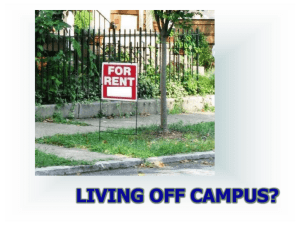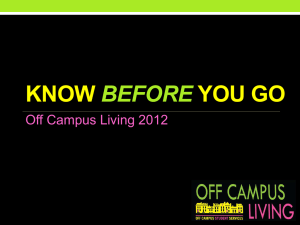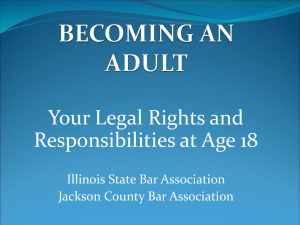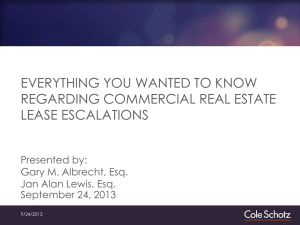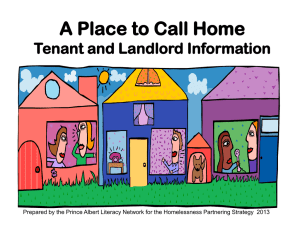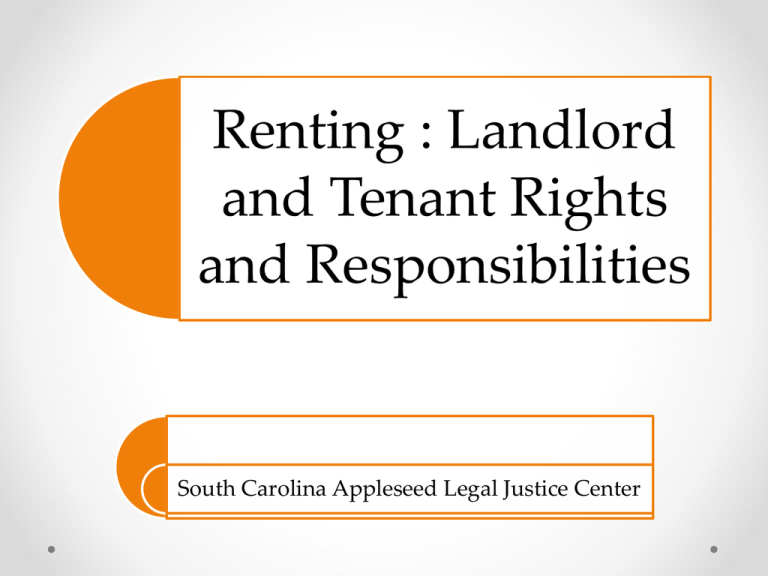
Renting : Landlord
and Tenant Rights
and Responsibilities
South Carolina Appleseed Legal Justice Center
South Carolina Appleseed Legal Justice
Center is dedicated to advocacy for lowincome people in South Carolina and effecting
systemic change by acting in and through
the courts, the legislature, administrative
agencies, communities and the media.
We help others do the same through
education, training and co-counseling. To
find out more about us, please visit
http://www.scjustice.org on the Internet.
For Informational Purposes
ONLY!
• This presentation is just for informational purposes.
• If you feel you need to speak with an attorney, you
have a few options:
o South Carolina Bar Referral Service
• Serves the General Public
• Contact: 1-800-868-2284
o Call South Carolina Legal Services
• Serves the low income community
• LATIS: 1-888-346-5592
Landlord and Tenant
Law in South Carolina
Landlord and Tenant Law in
South Carolina
• The South Carolina Residential Landlord-Tenant Act
protects landlords and tenants in most residential
leases.
• If you live in government assisted housing, you may
have even more protection under the law.
The Basics
Leases
What is required of the TENANT
What is required of the LANDLORD
Security Deposits
What to do when things go WRONG
• Repairs
• Late payments
• Evictions
• Damage to the apartment
Leases
• A LEASE is a CONTRACT between you and the
landlord.
• The lease should inform both the landlord and the
tenant what is to be expected from both parties for
the duration of the agreement.
• Like any other type of contract, a lease can be
enforced in court.
• When you sign the lease, you are agreeing to do
everything it says in the lease. If you violate that
agreement, the landlord can take you to court to
enforce that agreement.
Leases
Is a Written Lease Required?
• NO - In South Carolina, the law does not require that
a lease be in writing, but it is smart to have one.
• Always keep a copy of the signed lease for your
records
Leases
• What happens if I have signed the lease but the
landlord did not?
o If the landlord accepts a rent payment from you, it is the same as if he or
she signed the lease
• What if the landlord signed the lease but I never
signed the lease?
o If you have paid rent and taken possession of the apartment, it is the
same as if you had signed the lease yourself.
Signing the Lease
• When you read the lease, there may be some
things in it that you do not understand. If you don’t
understand something in a lease, ask a lawyer or
someone you trust to explain it to you.
• Do not rely on the landlord to explain something in
the lease to you. The landlord may not be honest
with you or may not explain it fully, or the landlord
might not know the answer.
Signing the Lease
There are
certain
things you
need to make
sure you
understand
before you
sign a lease
• The amount of rent and when it is due
• Late fees and how they are calculated
• How long the lease lasts
• Whether you have to pay a security deposit
and how much the security deposit is
• What, if any, utilities are included in the rent
• The Landlord’s rules about pets and
whether you have to pay a fee or deposit to
have a pet
Moving In
Checklist• Before you move into the apartment or house, you
want to make sure that you know the condition of
the place before you move in. It is a good idea to
walk through with your landlord and do a written
move-in checklist that shows what damage was in
the apartment before you moved in.
• There are plenty of templates available online
• You do not want to be blamed for the damage
done by the previous tenant!
Moving In
• The move-in “checklist” should be signed by both
you and the landlord. You should keep a copy of
the checklist with your lease.
• If you can, you should also take pictures of the
apartment right before you move in so you can
prove what damage was there when you moved
in.
Being a Good Tenant
• There are some basic rules that all tenants must follow:
o Pay your rent on time
o Keep the place SAFE and CLEAN
o Dispose of trash and waste from your apartment or house in
a clean and safe manner
o Keep plumbing fixtures clean
o Use the facilities and appliances in a reasonable manner
o Do not damage the place or allow your guests to do so
o Do not allow any illegal activity in the apartment or house
o Do not disturb your neighbors or allow your guests to do so
o Follow the lease, rules, and regulations, which may have
additional rules not listed here
Landlord Obligations
Landlords
MUST:
• Keep the place in good condition, including:
• Follow housing and building safety codes
affecting health and safety
• Make repairs on time
• Keep common areas (like laundry rooms)
reasonably safe
• Make sure that plumbing, heat, air, gas,
etc. is working properly
Repairs
• The landlord is required to “make all repairs and do
whatever is reasonably necessary to put and keep
the premises in a fit and habitable condition”
• This includes: electrical, gas, plumbing, sanitary,
heating, ventilation, air conditioning, and other
appliances supplied by the landlord
Repairs
• If you need the landlord to make a repair, put it in
writing and indicate that if the repairs have not
been made the rental agreement will terminate at
a date no sooner than 14 days after receipt of
notice
• Important: The law gives the landlord14 days after
you provide written notice to make or begin repairs
• If the repairs have been started but take more than
14 days to complete, the lease is not breached
unless the Landlord fails to pursue the repairs in
good faith within a reasonable time.
Repairs
• If the tenant, a member of his or her family, or the
tenant’s guest caused the damage, the tenant
cannot terminate the lease agreement.
• If the rental agreement is terminated because the
landlord has failed to make repairs, the landlord
shall return to the tenant any amounts of the
security deposit due to the tenant.
When can TENANT end the Lease?
• Through normal ending of the lease
o Written notice of termination of lease with at least one term’s notice
• If lease is week-to-week: One week’s notice
• If lease is month-to month: One month’s notice
• If Landlord does not follow lease, for example:
• Refusing to make repairs or breaching the lease in a
way that affects your healthy and safety or the physical
condition of the unit
o Tenant must give 14 days notice to Landlord – In writing
o Landlord has the opportunity to make repairs during the 14 days
When can the Landlord end my Lease?
Through normal ending of the lease
• Written notice of termination of lease with
at least one term’s notice
• If lease is week-to-week: One week’s
notice (the “term” is one week)
• If lease is month-to month: One month’s
notice (the “term” is one month)
When can the Landlord end my Lease?
If you do not do what your lease says, such as:
• Abandoning the Unit:
• Abandoning the rental unit: If there is an unexplained
absence by the Tenant for 15 days after a failure to pay rent
• If the Tenant has let the utilities be cut off and there is an
unexplained absence after failure to pay rent, the 15-day rule
does not apply
When can the Landlord end my lease?
Not paying your rent on time
• 5 day notice of nonpayment
• Your landlord must give written notice of nonpayment
and his/her intent to terminate the rental agreement if
rent is not paid during the five day period.
• LOOK at your lease: if this notice is already part of the
written rental agreement, no other notice is necessary
• You only get this notice once
Example:
• The written notice provision is satisfied if there is the
following (or substantially similar) language in the
lease:
IF YOU DO NOT PAY YOUR RENT ON TIME: This is your
notice. If you do not pay your rent within five days of
the due date, the landlord can start to have you
evicted. You will get no other notice as long as you
live in this rental unit.
Security Deposits
o When the lease ends the security deposit must be returned to the Tenant minus any amount held for rent and
damages due to Tenant’s noncompliance with the lease within 30 DAYS
o The Tenant must provide the Landlord in writing with a forwarding address for security deposit return
o The Landlord must provide Tenant with an itemized damage list
o Normal wear and tear does not come out of the security deposit
Security Deposits
• PROTECT YOURSELF!
• It bears repeating! Prior to moving in, make sure
both you and the landlord do a move-in checklist
that shows what damage was in the apartment
before you move in. This is important because you
do not want to be blamed for any damage that
you did not do. Both you and the landlord should
sign this checklist. Be sure to keep it with your lease
in a safe place.
• Remember: If possible, take photographs of the
apartment before you move in, being sure to note
any areas where there was previous damage,
stains, etc.
Security Deposits
• If the landlord fails to return to the tenant
the security deposit with the itemized notice
for money withheld, a tenant may be able
to recover up to three times the amount
wrongfully withheld and can also recover
reasonable attorney fees.
Evictions
• Remember, if you receive an eviction notice from
your landlord, you should call a lawyer
immediately. You have only ten (10) days from the
date that you received the eviction notice to file a
response with the court.
• Your landlord MUST file in court to have you legally
evicted. Your landlord cannot change the locks,
turn off the power, or put your personal property
outside.
Landlords CANNOT abuse their right of access
Access without your consent is only allowed:
• In the case of an emergency
• Between 9AM-6PM for regularly scheduled
services IF clearly stated in rental agreement and if
the Landlord announces the intent to do so prior
to entering
• Between 8AM-9PM to provide services requested
by the Tenant, and if the Landlord announces the
intent to do so prior to entering.
A few words about
Fair Housing Laws
• Federal and state law says that a landlord cannot
treat you differently or refuse to rent to you because
of your:
- RACE
- Color
- Gender
- Religion
- National Origin
- Disability
- Familial Status (pregnancy/children in the home)
Housing Discrimination
• Sex Discrimination : can happen to both men and women
• How do you know if someone is discriminating
against you because of your sex?
o The landlord offers you a lower rent in exchange for sex
o The landlord will not fix your apartment unless you have sex with
them
o The landlord threatens to evict you if you do not agree to have
sex
o Tries to evict you from Public Housing because you are a victim of
domestic violence, dating violence, or stalking
To file a Housing Discrimination
Complaint:
South Carolina Human Affairs Commission
•Call 1-800-521-0725
Department of Housing and Urban Development
(HUD):
•Call 1-800-669-9777 or 1-800-440-8091
Foreclosures
• In 2009, President Obama signed into law the Protecting
Tenants at Foreclose Act
• If the owner of your apartment or house is foreclosed on
while you are living in the apartment, you have certain
rights as a tenant.
• If you have a lease, the new owner must abide by your
lease (with an exception for an owner-occupation).
• If your lease is month to month or less than 90 days
remain, you are given 90-days once the new owner has
given you notice that he/she wants to terminate the
rental.
Let’s Review!
What is a security deposit?
• It is the tenant’s money or property held by the
landlord in case there are damages to the unit or
the tenant doesn’t pay rent
How do I get my deposit back when I move?
• Ask for your deposit and give the landlord your new
address in writing
Let’s Review!
What does the landlord have to provide you with if he
or she does not return your full deposit?
• The landlord must provide an itemized list showing
what has been taken from your deposit and why
How long does the landlord have to return the
deposit?
• The landlord has 30 days after you move out or
after you ask for it back, whichever is later
Let’s Review!
What do I do if the my stove stops working?
• The landlord must keep all appliances that came
with the apartment in reasonably good and safe
working order. Tell your landlord. It is best to inform
your landlord in writing.
What happens if the hot water heater stops working
and the landlord refuses to fix it?
• If you have informed your landlord in writing that he
or she has 14 days to make repairs or you are
terminating the lease, you can move and will no
longer owe him or her any more rent.
Let’s Review
I came home from the store and my landlord was in
my house. Can they do that?
• Your landlord cannot be in your house without
notifying you unless there is an emergency.
• Some examples of an emergency would be a fire or
if there were broken pipes.
• If it is a non-emergency, the landlord usually must
give you 24 hours notice and can only enter
between 9AM-6PM
For Informational Purposes
ONLY!
• This presentation is just for informational purposes.
• If you feel you need to speak with an attorney, you
have a few options:
o South Carolina Bar Referral Service
• Serves the General Public
• Contact: 1-800-868-2284
o Call South Carolina Legal Services
• Serves the low income community
• LATIS: 1-888-346-5592

